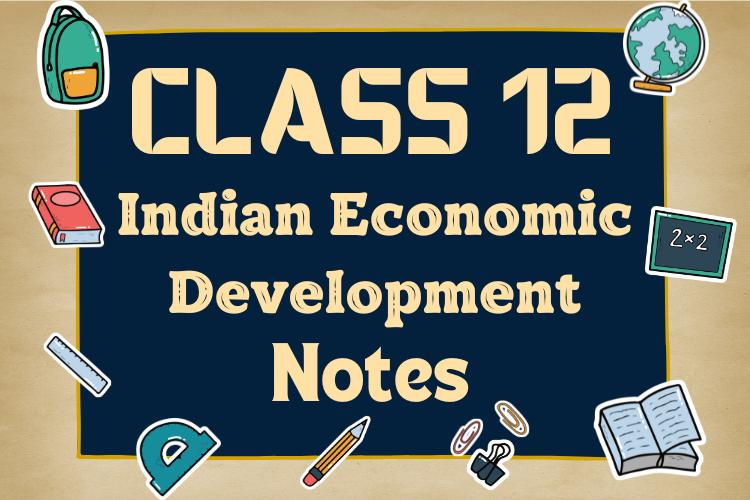
Indian Economic Development Notes : CBSE Class 12 Free PDFs Download
Indian Economic Development in CBSE Class 12 plays a pivotal role in shaping students’ understanding of the Indian economy, its challenges, and its growth trajectory. CBSE Class 12 Indian Economic Development Notes PDFs are an excellent resource for students looking to improve their grades while also learning more about the country’s economic structure.
CBSE Class 12 Indian Economic Development Notes are one of the most important study materials for the Commerce stream. This subject need a significant amount of revision. We at CHK provide CBSE Revision Notes for Class 12 Economics to help students remember important aspects. Revision is undoubtedly an important aspect of self-studying. A successful revision is a key aspect in achieving good grades and academic achievement. Students who fail to revise frequently receive poor grades.
How do CHK’s revision notes help?
- CHK’S Revision notes surely assist pupils achieve well in their future examinations.
- Making revision notes allows you to organise your learning.
- Students must understand and revise crucial concepts from the CBSE Class 12 syllabus.
- It lets you recognise the key elements to learn for the exams.
CBSE Class 12 Indian Economic Development Notes PDFs Download
These revision notes are developed by the latest CBSE rules, which are mandatory for all students in Class 12. Since they lay the groundwork for all students at this level, these notes should be carefully studied. You can download the CBSE Class 12 Indian Economic Development Notes PDFs, chapter by chapter, from the CHK website or app on your smartphone.
| Chapter 1 | INDIAN ECONOMY ON THE EVE OF INDEPENDENCE | CLICK HERE |
| Chapter 2 | INDIAN ECONOMY 1950–1990 | CLICK HERE |
| Chapter 3 | LIBERALISATION, PRIVATISATION AND GLOBALISATION: AN APPRAISAL | CLICK HERE |
| Chapter 4 | HUMAN CAPITAL FORMATION IN INDIA | CLICK HERE |
| Chapter 5 | RURAL DEVELOPMENT | CLICK HERE |
| Chapter 6 | EMPLOYMENT : GROWTH, INFORMALISATION AND OTHER ISSUES | CLICK HERE |
| Chapter 7 | ENVIRONMENT AND SUSTAINABLE DEVELOPMENT | CLICK HERE |
| Chapter 8 | COMPARATIVE DEVELOPMENT EXPERIENCES OF INDIA AND ITS NEIGHBOURS | CLICK HERE |
Chapter 1: INDIAN ECONOMY ON THE EVE OF INDEPENDENCE
This chapter describes the characteristics of the Indian economy and its evolution following independence. It is critical to look back and understand where it all began by studying India’s previous economy.
Chapter 2: INDIAN ECONOMY 1950–1990
This chapter discusses India’s efforts after independence to establish a stable economy. It explores how capitalisation and socialism had an important role. Students will learn about the importance of India’s economic planning initiatives. These methods include five-year plans, modernisation, and quality.
Chapter 3: LIBERALISATION, PRIVATISATION AND GLOBALISATION: AN APPRAISAL
This chapter explains how international organisations, such as the World Bank and the IMF, forced India to modify its second policies in 1991. Reforms to the industrial and financial sectors are covered in two chapters. It focusses on the concepts of liberalisation, privatisation, and globalisation. It explains how privatisation enhances the performance of the public sector. Globalisation is the end outcome of both privatisation and globalisation together.
Chapter 4: HUMAN CAPITAL FORMATION IN INDIA
Chapter 12 of Economics. This chapter discusses Indian economic development, including themes such as human resources. Students will rapidly grasp concepts such as economic growth, human capital, and development.
Chapter 5: RURAL DEVELOPMENT
This chapter discusses critical aspects affecting ruler development in India. Students will learn about the relevance of rural development in the overall growth of the Indian economy.
Chapter 6: EMPLOYMENT : GROWTH, INFORMALISATION AND OTHER ISSUES
It covers fundamental topics like workforce and economic activity, as well as the board’s explanation of unemployment. Students will learn how elements such as men’s and women’s fortification are crucial to the Indian economy.
Chapter 7: ENVIRONMENT AND SUSTAINABLE DEVELOPMENT
It emphasises the relevance of the human-nature relationship for the country’s and economy’s long-term growth.
Chapter 8: COMPARATIVE DEVELOPMENT EXPERIENCES OF INDIA AND ITS NEIGHBOURS
Students will learn how India’s political system varies from its neighbours. All planned developments are essentially identical, but their implementation varies across India, China, and Pakistan.
Conclusion
CBSE Class 12 Indian Economic Development Notes PDFs are a must-have resource for students aiming to excel in their exams. These notes simplify complex economic concepts, save time during revision, and enhance problem-solving skills. With concise explanations, examples, and data-driven insights, these PDFs help students build a comprehensive understanding of India’s economic development. Whether you are preparing for exams or seeking to better understand the economic issues facing India today, well-organized notes will give you the edge you need for success. With the material provided above, you may efficiently study Indian Economic Development, and the review notes will help you improve your score. Download CHK’s Indian Economic Development Class 12 Notes PDF for a better studying experience.
Check out also – CBSE Class 12 Macroeconomics Notes PDF Free Download
Indian Economic Development Notes FAQs :
Q1. Why is ‘Indian Economic Development Notes’ such an important subject of study?
Indian Economic Development, a crucial part of the CBSE Class 12 Economics syllabus, focuses on various economic policies, strategies, and developmental challenges faced by India. The course explores topics such as:
- Economic Growth and Development
- Poverty, Unemployment, and Inequality
- Infrastructure and Sustainable Development
- Foreign Trade and Investment
- Government Policies and Initiatives
It equips students with an understanding of how the Indian economy has evolved post-independence, the challenges it faces, and the policies that have shaped its current structure. The subject is not only crucial for academic exams but also serves as a foundation for understanding India’s economic landscape in real-life scenarios.
Q2. How to Make the Most of Indian Economic Development Notes PDFs
- Regular Revision
Go through your notes regularly, especially when preparing for exams. This will help reinforce your understanding and improve recall. - Use Notes for Active Learning
Don’t just read the notes passively. Engage with the content by taking notes, highlighting key sections, and revising concepts in your own words. - Practice Applying Concepts
After studying the notes, attempt questions from previous years and practice papers. Focus on application-based questions that test your understanding of policies, reforms, and real-world scenarios. - Stay Updated
Economic development is a dynamic field, and new policies or developments may emerge. Stay updated with current affairs related to India’s economy and add relevant data to your notes, which may help in exams.
for more information contact us –
Ph. No. – +91-6367885579
WhatsApp – Click to chat
facebook – @commercehubkota
Instagram – @comerc_classes
Youtube – @commercehubkota
Telegram – @comerc.in



